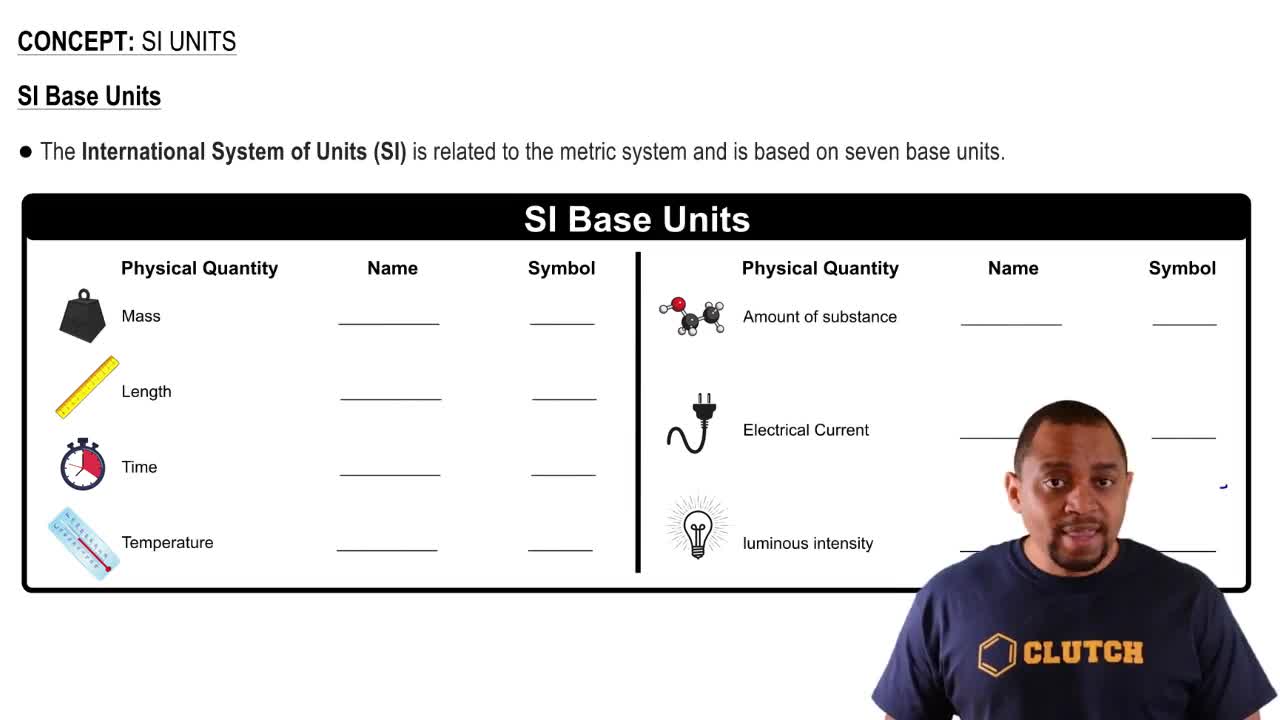Write the nuclear equation for the fusion of two H-2 atoms to form He-3 and one neutron.
Ch.21 - Radioactivity & Nuclear Chemistry
Chapter 21, Problem 67
If 1.0 g of matter is converted to energy, how much energy is formed?
 Verified step by step guidance
Verified step by step guidance1
insert step 1> Determine the formula to use for converting mass to energy. The relevant equation is Einstein's mass-energy equivalence formula: $E = mc^2$, where $E$ is energy, $m$ is mass, and $c$ is the speed of light in a vacuum.
insert step 2> Identify the given values in the problem. Here, the mass $m$ is 1.0 g. Note that the speed of light $c$ is a constant, approximately $3.00 \times 10^8$ m/s.
insert step 3> Convert the mass from grams to kilograms, since the standard unit of mass in physics is kilograms. Remember that 1 kg = 1000 g, so 1.0 g = 0.001 kg.
insert step 4> Substitute the values into the equation $E = mc^2$. Use $m = 0.001$ kg and $c = 3.00 \times 10^8$ m/s.
insert step 5> Calculate the energy $E$ by performing the multiplication. This will give you the energy in joules (J), which is the standard unit of energy in the International System of Units (SI).

Verified Solution
Video duration:
1mWas this helpful?
Key Concepts
Here are the essential concepts you must grasp in order to answer the question correctly.
Einstein's Mass-Energy Equivalence
Einstein's mass-energy equivalence principle, expressed by the equation E=mc², states that mass can be converted into energy. In this equation, E represents energy, m is mass, and c is the speed of light in a vacuum (approximately 3.00 x 10^8 m/s). This principle underlies nuclear reactions and explains how a small amount of mass can yield a large amount of energy.
Recommended video:
Guided course

Energy to Mass Conversion
Unit Conversion
In chemistry and physics, unit conversion is essential for accurately calculating quantities. When converting mass to energy using E=mc², it is crucial to ensure that the mass is in kilograms (kg) since the speed of light is in meters per second (m/s). For example, 1.0 g of matter must be converted to kilograms (1.0 g = 0.001 kg) before applying the equation.
Recommended video:
Guided course

Conversion Factors
Energy Units
Energy is commonly measured in joules (J) in the International System of Units (SI). Understanding how to express energy in joules is important when calculating the energy produced from mass conversion. For instance, using E=mc² with the correct mass in kilograms will yield the energy in joules, allowing for a clear understanding of the energy produced from the conversion of matter.
Recommended video:
Guided course

SI Units
Related Practice
Textbook Question
696
views
Textbook Question
Write the nuclear equation for the fusion of H-3 with H-1 to form He-4.
730
views
Textbook Question
Rutherfordium-257 was synthesized by bombarding Cf-249 with C-12. Write the nuclear equation for this reaction.
572
views
Textbook Question
A typical home uses approximately 1.0⨉103 kWh of energy per month. If the energy came from a nuclear reaction, what mass would have to be converted to energy per year to meet the energy needs of the home?
667
views
2
rank
Textbook Question
Calculate the mass defect and nuclear binding energy per nucleon of each nuclide. a. Li-7 (atomic mass = 7.016003 amu)
1438
views
Textbook Question
Calculate the quantity of energy produced per gram of U-235 (atomic mass = 235.043922 amu) for the neutron-induced fission of U-235 to form Xe-144 (atomic mass = 143.9385 amu) and Sr-90 (atomic mass = 89.907738 amu) (discussed in Problem 57).
1942
views
1
rank
